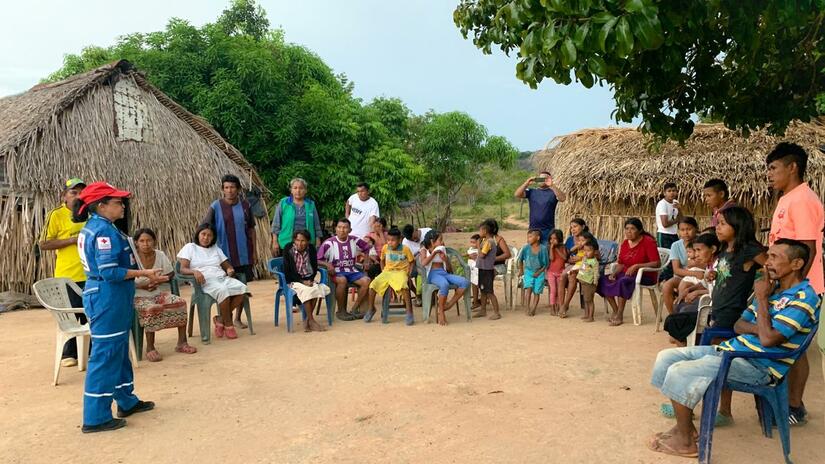By Melissa Monzon
“When should we wash our hands?” asks Sergio Gutierrez, to three children who have been listening to him very carefully. The children respond in chorus “Before eating, after going to the bathroom…”, one of the kids looks at Sergio doubtfully, and Sergio looks back at him as if saying You can do it. “…and after playing”, answers the little one with the pride that a student shows when he has learned the lesson.
These children, who are from Venezuela, have been participating in the recreational activities carried out by the Colombian Red Cross in the municipality of Puerto Carreño, capital of the department of Vichada, Colombia.
“We carry out close, pedagogical work with children, teenagers, expectant and nursing mothers, especially on the current issue that is COVID-19. Through recreational activities and characters, whether puppets or working with volunteers, we have been able to interact with families, to continue raising awareness and creating space for reflection on issues that meet the needs of the population”, says Sergio, a psychologist who moved from his native Bucaramanga to Vichada to take care of the Colombian Red Cross’ protective space, where children, teenagers and adults learn by playing, strengthening their bonds and providing them with a protective environment with actions focused on mental health and psychosocial well-being.
To get to Bogota, the country’s capital, from Vichada, one must make a trip by bus that will take two days approximately, with many transfers. Vichada is a department with many needs, and also a border crossing for those who migrate from Venezuela to Colombia, whether it is their final destination or transit through to another country. It is also a territory with a diverse ecosystem, crossed by the Meta and Orinoco rivers, with enormous cultural and social potential, which demands a comprehensive and sustainable humanitarian response, that guarantees collective participation for development.
In Vichada, poverty rates are high, and access to health services is scarce: the proportion of people with unsatisfied basic needs in the department reaches 67% according to the Colombian National Administrative Department of Statistics, and the situation of indigenous communities (many of them cross-border, and that represent more than 58% of the population) is worrying: only about 10% of the indigenous population in Vichada has electric power service, the aqueduct coverage reaches only 9% of indigenous people, and in general, health care services are very limited, directly affecting the quality of life in the area.
The arrival of COVID-19 has made the situation even more complex. Since April 2019, the Colombian Red Cross has been providing health care, nursing and psychology services, health promotion and disease prevention activities, as well as the delivery of free medicine aimed at migrants and vulnerable local population, as well protection services through the protective space. Now, during the pandemic, it is the only organization providing continuous ambulatory health services in the area, because the municipality hospital, temporarily, only provides emergency care.
For Jessica Teheran, nurse at the Vichada branch, what is more satisfying, beyond giving health care, is knowing that she is contributing to behavioural change: “We are not only providing medical or psychological care, but we are also teaching the new mother who does not know how to breastfeed, raising awareness of the elderly who may not follow their hypertension treatment, congratulating the future mother who even through difficult times has the desire to continue with her pregnancy. Being in Vichada and working with all of them totally changed my vision of the world, thus enriching my personal and professional life.”
Until the end of June 2020, the Colombian Red Cross – Vichada branch, with the support of IFRC trough the Emergency Appeal: Colombia Population Movement, has provided more than 27,000 health services, almost 10,000 of them in nursing services, more than 4,800 psychology services and attended to about 3,500 children and vulnerable population in its protective space. In addition, in each health care attention, patients received free medicine and participate in educational talks on disease prevention and health promotion, and themes related to mental health. Likewise, hygiene kits, prenatal kits, food kits, psychosocial support kits, condoms and hand sanitizers have been delivered. Finally, two hydration points have been installed in the department to provide access to safe water to anyone who needs it.
“The impact that the work has in the migrant population is evidenced on a daily basis in the medical consultations with grateful patients, since they find in the Colombian Red Cross, not only assistance, but also a friendly helping hand in this vulnerable situation to which they are exposed. For me as a migrant, it is a gratifying experience to be able to work with other migrants, to be able to offer them guidance or words of encouragement”, concludes Ligia Helena Gómez, Venezuelan by birth, and doctor of the population movement project of the Colombian Red Cross in Vichada.
[embed]https://www.youtube.com/watch?v=yBEm1Y3F8JU[/embed]
*some shots of this video were taken before COVID-19 reached Colombia
Article
Sudan: 'the most difficult year' after outbreak of conflict
Sudan: 'the most difficult year' after outbreak of conflict
| Article

